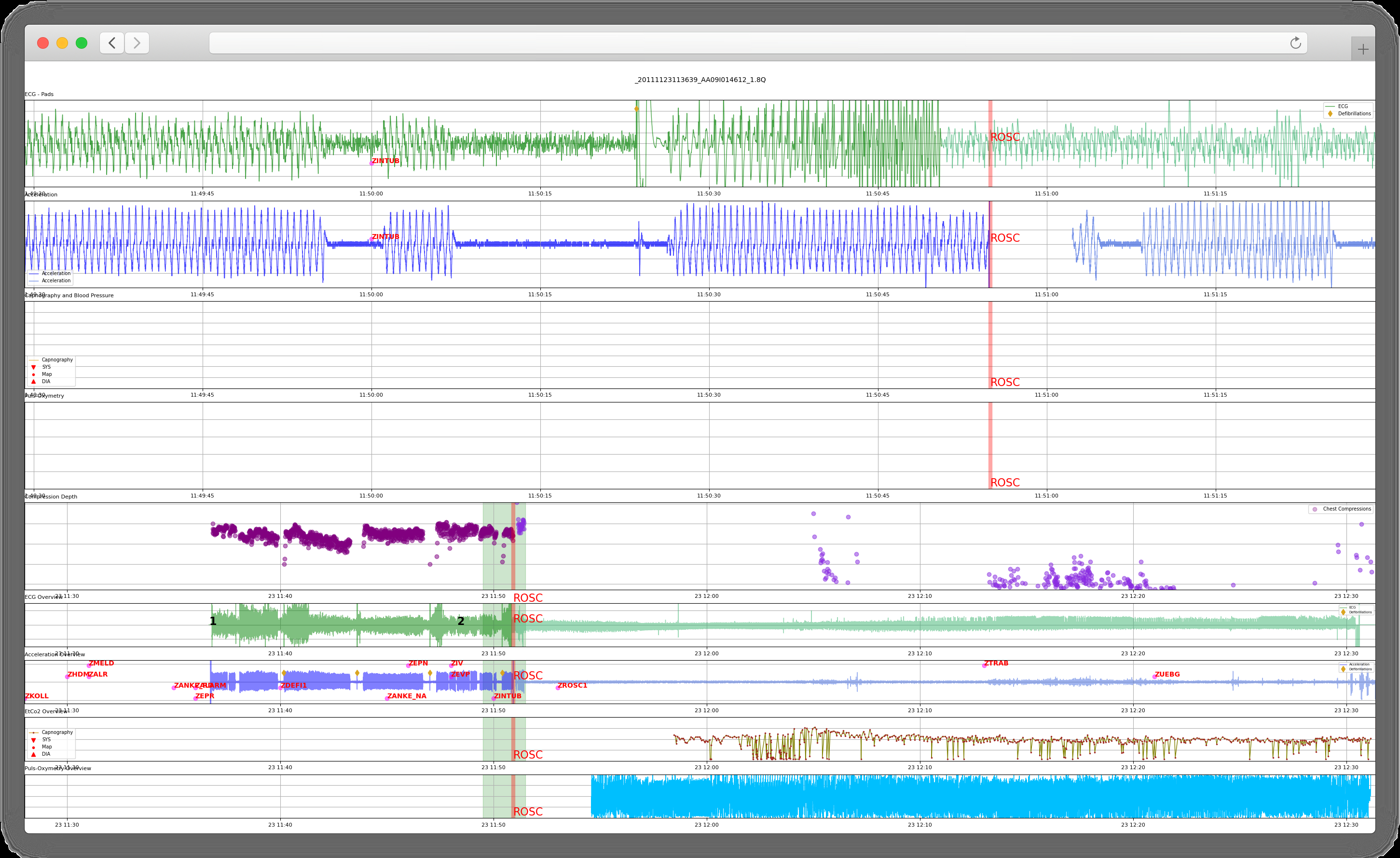Final ID: Su806
Enhancing Cardiac Arrest Registries and Research – A Framework for Handling Defibrillator Data
Abstract Body: Background
Cardiac arrest is the most time-sensitive medical condition, and survival probability is highly dependent on early, high-quality cardiopulmonary resuscitation (CPR) measures. Resuscitation registries are established tools for continuous quality improvement and serve as a source for research. Yet they lack comprehensive information on the quality of CPR measures themselves—such as the depth, rate, and release of chest compressions—and are limited in the temporal resolution of these measures. However, data on both are contained in the recordings of defibrillators.
Aims
To develop a framework for healthcare providers to gain immediate case-specific feedback, reduce documentation efforts and make fine-grained information accessible for research.
Approach
An open-source Python module named CPRDAT (Kern et al. Zenodo, https://doi.org/10.5281/zenodo.10057964) was designed. This module is capable of importing and extracting data from various defibrillators as well as data recorded by VitalRecorder (VitalDB, Department of Anesthesiology and Pain Medicine, Seoul National University College of Medicine, Seoul, Korea) into a uniform data object. Methods were implemented to automatically process, analyze, and aggregate these time-series of physiological signals, with particular attention to CPR. To reduce manual annotation workload, classification algorithms were developed.
Plotting routines were developed to display the signals interactively in web applications, allowing healthcare providers to interact with the data through zooming, scaling, shifting, concatenating, merging and labelling.
Results
The module was implemented into the German Resuscitation Registry, offering users a manufacturer-agnostic, data-driven, case-specific debriefing tool. Extracted information on CPR measures is stored in the registry. The framework, able to manage multiple time-series data sources, was further implemented in other settings, such as the analysis of laboratory data of a CPR swine model.
Conclusions
The new module dramatically enhances the accessibility of physiologic time-series recordings. More fine-grained data will provide deeper insights into processes and CPR physiology. Finally, the open-source Python module abolishes barriers in research.
Cardiac arrest is the most time-sensitive medical condition, and survival probability is highly dependent on early, high-quality cardiopulmonary resuscitation (CPR) measures. Resuscitation registries are established tools for continuous quality improvement and serve as a source for research. Yet they lack comprehensive information on the quality of CPR measures themselves—such as the depth, rate, and release of chest compressions—and are limited in the temporal resolution of these measures. However, data on both are contained in the recordings of defibrillators.
Aims
To develop a framework for healthcare providers to gain immediate case-specific feedback, reduce documentation efforts and make fine-grained information accessible for research.
Approach
An open-source Python module named CPRDAT (Kern et al. Zenodo, https://doi.org/10.5281/zenodo.10057964) was designed. This module is capable of importing and extracting data from various defibrillators as well as data recorded by VitalRecorder (VitalDB, Department of Anesthesiology and Pain Medicine, Seoul National University College of Medicine, Seoul, Korea) into a uniform data object. Methods were implemented to automatically process, analyze, and aggregate these time-series of physiological signals, with particular attention to CPR. To reduce manual annotation workload, classification algorithms were developed.
Plotting routines were developed to display the signals interactively in web applications, allowing healthcare providers to interact with the data through zooming, scaling, shifting, concatenating, merging and labelling.
Results
The module was implemented into the German Resuscitation Registry, offering users a manufacturer-agnostic, data-driven, case-specific debriefing tool. Extracted information on CPR measures is stored in the registry. The framework, able to manage multiple time-series data sources, was further implemented in other settings, such as the analysis of laboratory data of a CPR swine model.
Conclusions
The new module dramatically enhances the accessibility of physiologic time-series recordings. More fine-grained data will provide deeper insights into processes and CPR physiology. Finally, the open-source Python module abolishes barriers in research.
More abstracts on this topic:
An Innovative telemonitoring-wearable device with third heart sound detection for early detection of worsening heart failure
Masuda Hirotada, Ekuni Shota, Misumi Yusuke, Akazawa Yasuhiro, Sakata Yasushi, Miyagawa Shigeru
A REPORT OF >2000 CONSECUTIVE NON-SELECTED PATIENTS UNDERGOING IMAGING WITH PACEMAKER'S AND ICD'S IN THE MRI ENVIRONMENT; THE ADDITIVE VALUE OF A LARGE, PROSPECTIVE >20-YEAR OBSERVATIONAL STUDYBiederman Robert, Shah Moneal, Lombardi Rich, Boltralik Mark, Mangini Francesco, Doyle Mark

